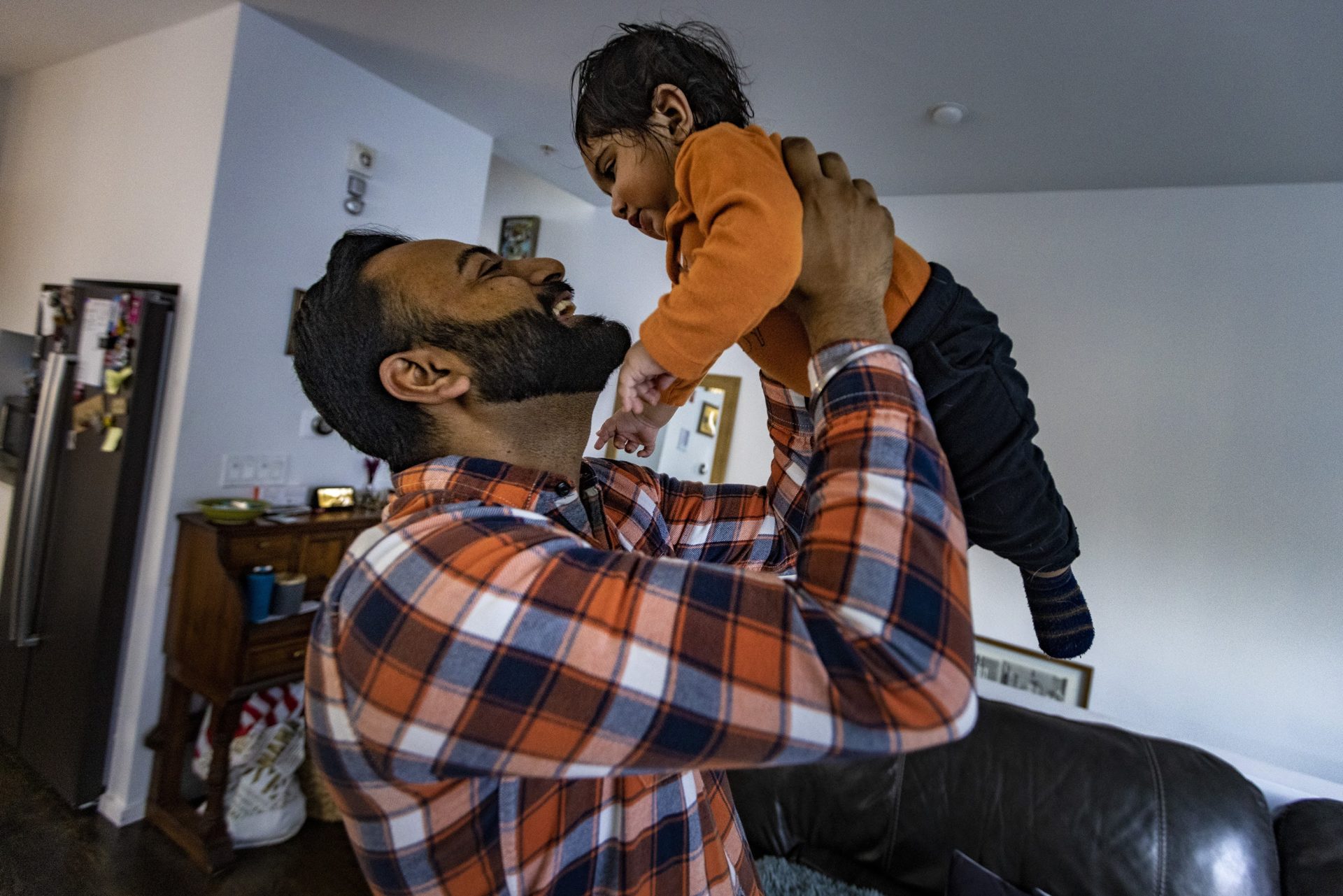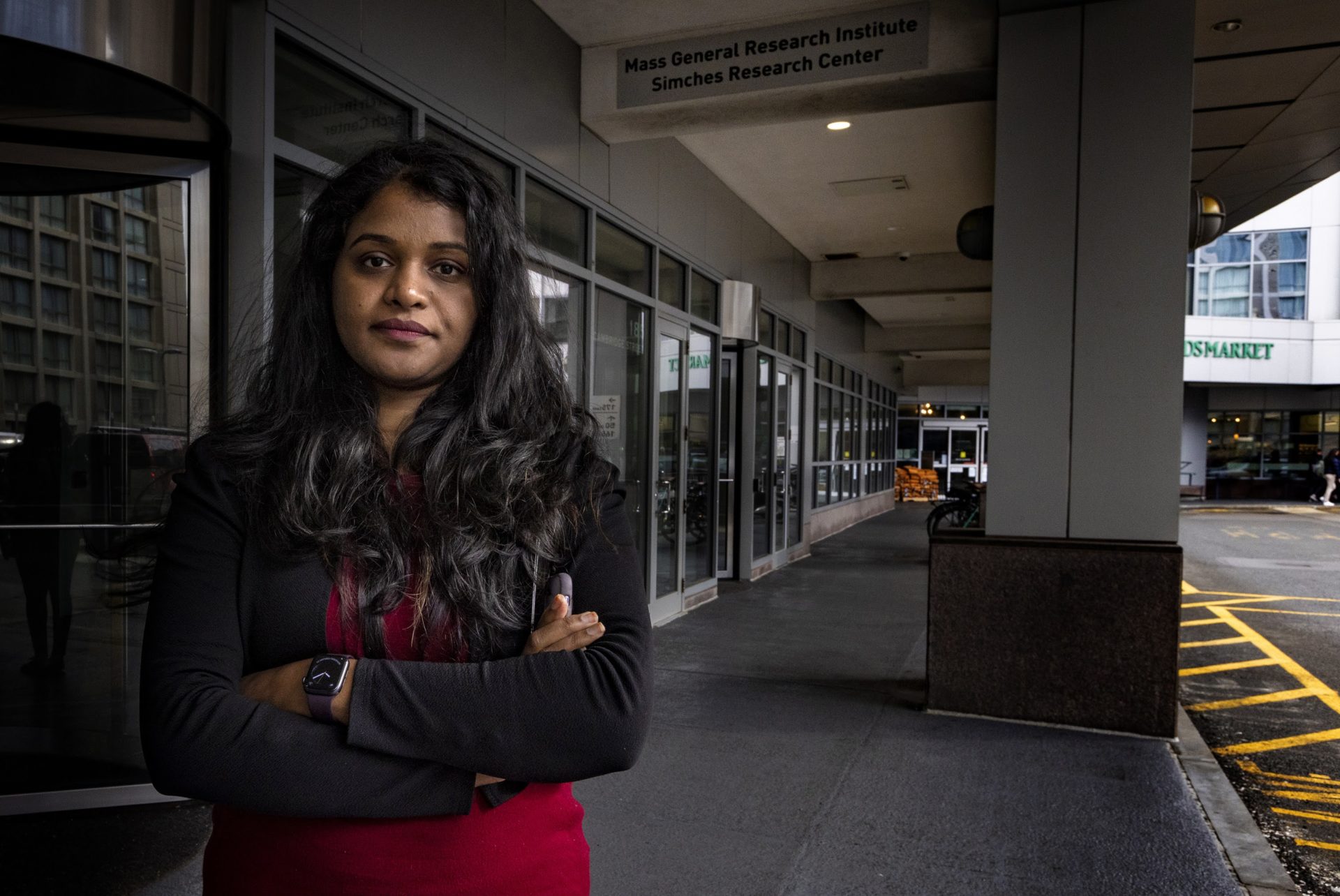Visa renewal backlogs leave some Mass. workers torn between work and family

Raj Paik lifts his nine-month-old son Siraj after getting home from work. (Jesse Costa/WBUR)
Dr. Rajandeep Singh Paik wants to celebrate his son’s first birthday in his hometown in India. COVID-19 cases are dropping. Cities are loosening mask mandates. People are planning vacations and traveling internationally again.
However, Paik, who lives in South Boston, cannot leave the United States because he wouldn’t be allowed to come back on his visa that expired during the pandemic. He hasn’t been home in more than two years.
“We haven’t been able to meet any of our other family, any of our friends, you know, our pets back home, the streets of our hometown, the food we used to eat there,” he said.
Listen to the audio version of this story at WBUR.org.
Paik, a rheumatologist in Malden, is among the thousands of working professionals — doctors, engineers, researchers and others — who are authorized to work and live in the U.S., but their work visas have expired so they are essentially stuck here. They can leave the United States but can’t re-enter.
To renew his visa, Paik needs to find an appointment for an in-person interview at a U.S. embassy or consulate in India. These appointments are incredibly hard to get right now, with high demand and long wait times.
“When the pandemic happened, a lot of the U.S. consulates and embassies … closed and a backlog was created,” said Annelise Araujo, an immigration attorney and chair of the New England chapter of the American Immigration Lawyers Association.
The State Department’s website shows a wait time of more than eight months to get an appointment at the U.S. embassy in New Delhi, the city closest to Paik’s hometown, Chandigarh. Appointment availability changes weekly and there’s no guarantee Paik can actually get one. Other U.S. consulates in India also have similar problems.
In Canada, there is a year’s wait for appointments at some U.S. consulates. Applicants in Istanbul have to wait nearly two years. In Nepal, people can’t even get visa appointments unless it’s a medical or business emergency, or there’s a death in the family.
Since last year, Indian workers on visas have been constantly checking the visa website for open slots.
Aatira Vijay, a researcher at Massachusetts General Hospital, is one of them. Her visa expired last spring and she has been hunting for appointments to go home to India to get it renewed — or to bring her parents to Boston on a tourist visa.
“Every single day when I come to the lab, the first thing that I check is I check for my appointment and then in the evening, I check for my parents’ appointment,” she said.
While searching for appointment times, she said she was careful about the curveball the visa website threw at her. Applicants get locked out for up to 72 hours if they keep refreshing the page to see if new openings have popped up.

Aatira Vijay in front of the entrance of the Simches Research Center at Massachusetts General Hospital. (Jesse Costa/WBUR)
Vijay said it was “emotional hell” juggling pregnancy and searching for appointment times while working and recovering from COVID.
When Vijay’s parents in India got COVID last month, her anxiety shot up.
“It’s emotionally draining to think about your parents — what they are doing,” she said. “As a daughter, I should be there for them,” she said.
But she knew she could not go.
A few days after she spoke with WBUR, Vijay’s persistence paid off. She snagged an appointment for herself in New Delhi for June and is looking forward to going home.
Many others have found creative ways to find appointments via Telegram, a messaging app. More than 100,000 members on a visa group track appointment availability and alert each other if a slot opens up. If none are available, there’s no point in wasting their login quota for the day.
Afraid of being stranded
Immigration lawyers said delays are affecting work and student visas. Araujo has been advising her clients on expired visas not to leave the United States.
“For any person who asks me, ‘Should I travel overseas?’ I think my conservative advice is, ‘Don’t go. Not now. What happens if you go and your interview gets canceled last minute? What happens if you cannot get a visa in your passport to come back?’ ” she said.
That’s why Paik has not left the country. He said even if he gets an appointment, he could be delayed in India, and his patients in Malden will suffer.
“I can’t afford to be stuck there for six weeks,” he said. “I cannot treat a patient with swollen joints or, you know, a patient with lupus, remotely via telemedicine.”
Ariel Pollock, the spokesperson for the U.S. embassy in New Delhi, said teams throughout India “are working at maximum possible safe staffing levels.”
“Pandemic-related local lockdowns, travel restrictions, staffing limitations, and social distancing requirements mean it will take some time to return to normal even as we resume full volume operations, and wait times will remain significant for the foreseeable future,” she said.
The U.S. State Department has made it easier for some. Applicants still need to go to their home country for a visa renewal, but some can bypass in-person interviews and drop off their passport at a set time.
After snagging an in-person appointment at a U.S. consulate or embassy abroad, a person would attend the interview and hand over the passport for processing. The visa office would stamp a new visa in the passport and then return it to the applicant.
Before the pandemic, families made travel plans around this appointment and were able to make it in time for the flight back to the United States. The unpredictable nature of the pandemic has made this risky. Staffing at embassies and consulates can change with every surge, leading to a disruption in operations.
The fear of being stranded abroad due to visa delays has led to many immigrant workers missing life-changing events.
Srinivasa T A Pillai, a hardware engineer living in the San Francisco Bay area, learned in early April last year that his parents in India were in a hospital suffering from COVID.
About a month later, both of his parents died and he watched his brother light their funeral pyres on a video call. Since their deaths, he said he’d been aching to go home to support his family in the wake of this loss, but he could not because his visa was about to expire in a few weeks.
He said he didn’t care if he got COVID while traveling to Chennai, but was not emotionally prepared to deal with the uncertainty of the visa renewal process.
“I made the decision, probably the hardest I’ve ever taken, to be here and not go back home because I was not sure if I can predictably return to my employment.”
